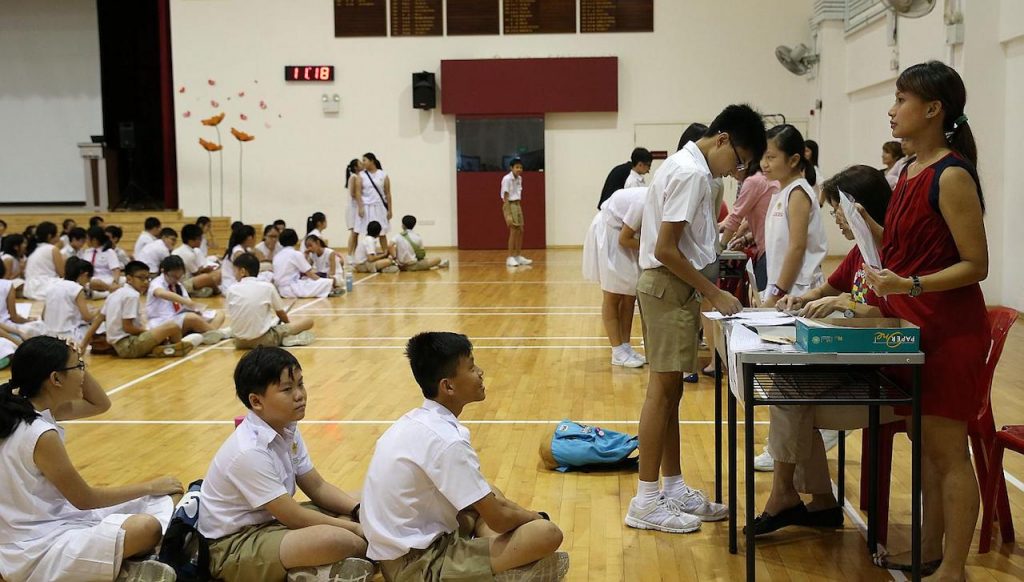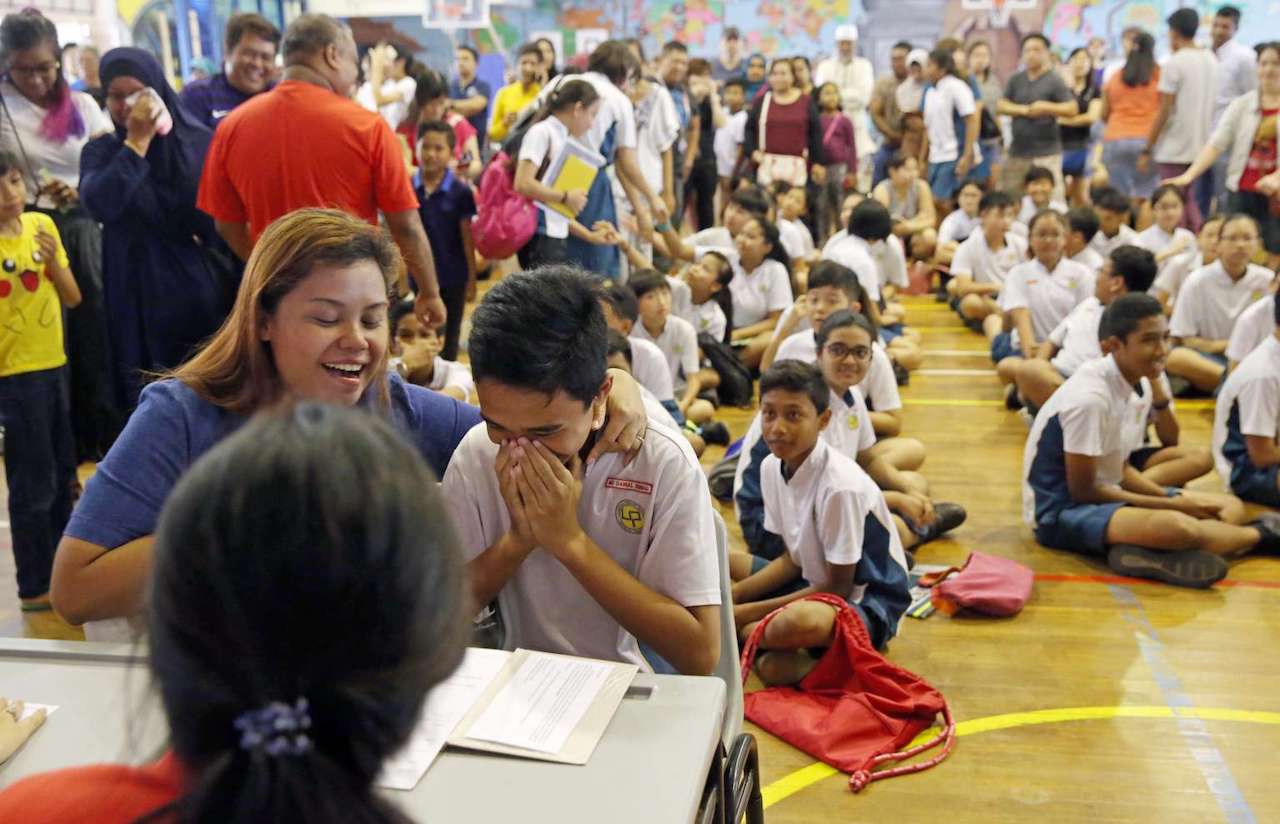I took my PSLE more than 12 years ago and got a 238 for my efforts. I don’t remember a single math problem or what xiao ming and xiao hua did in my Chinese essay, but I do remember the Mediacorp drama that followed the release of our results.
There were tears and histrionics when an overachieving girl from the EM1 stream scored a ‘measly’ 245 for her PSLE. Her mom had expected great things of her (read: Nanyang Girls) and as it turns out, she had deceived everyone all along by forging signatures on any test where she scored less than a 90.
An awkward, soft-spoken boy from China made his way to Raffles Institution, much to everyone’s awe. He was chubby, unathletic, and spoke with a thick accent. But the halo of ‘R.I.’ would forever remove him from the plane of mere mortals.
In our eyes, he was anointed and he had ascended.
Closer to earth, my own parents were aggrieved to find out that the son of the mama shop owner downstairs had leapfrogged ahead of me to Catholic High School—a violation of some invisible social order. I hated him too, but mainly because his dad rewarded his achievement with an Xbox and he never invited me to play Halo.
I narrate these events not because I feel nostalgia for them but because nothing has changed and they continue to illustrate the same point point: PSLE matters. Whether you like it or not, those three digits matter to your future success because they alone determine your value in the system.
Puberty was still a speck on the horizon for us, but T-scores had already imposed some invisible pecking order to the world as we found it. Nobody knew where they were going in life, but the scores told us who was on the up and who was down, who had outdone himself and who was a ‘disappointment’.

Last year’s festivities featured Benjamin Kheng lamenting the ‘cancerous attitude towards PSLE’. This year’s response is more subdued, but I’m sure that most readers would be familiar with all the hit singles: ‘Every School is a Good School’, ‘There Are Many Beautiful Paths to Success’ and the classic ‘Limpeh-PSLE-Last-Time-17-Points-But-Is-Now-A-Millionaire (Hence-PSLE-Don’t-Matter)’.
The first is a blatant lie, the second is a meaningless motivational poster, and the third is 2 parts anecdotal evidence mixed with 1 part survivor’s bias. But above all, the sheer frequency with which we repeat these fairytales undermine their message that PSLE is of no importance.
If the grades don’t really matter, why waste so much time and breath insisting that it is okay to do badly? If you’re not a racist, why go about starting your sentence with the preamble ‘I’m not racist but…’? These loud protestations only serve to reaffirm the truth that they are trying to deny. Like it or not, you will be judged on the basis of that T-score and it will go on to shape your life.
It is disingenuous to suggest otherwise.
Sure, you can succeed spectacularly whatever your results, but that let’s not pretend that there is zero correlation between going to Raffles Institution and your future worldly success. Adolescence is a formative period and spending those crucial years in a well-funded bosom amongst other motivated, like-minded peers never hurt anybody’s chances.
Perhaps the more interesting question is why. Why does it continue to matter when everyone seems to fervently hope for the opposite?
The answer, I think, lies in Singapore’s meritocracy. There is nothing wrong with a meritocracy, but something is surely amiss in our definition of merit.
For most parents of an orthodox bent, merit lies in a good education, a well-paying job and stable career progression leading up to more digits in the bank account. If that is how our society defines success, then surely PSLE matters because it is the first rung in that familiar ladder leading from SAP school to scholarship to a cushy position in the civil service.
If we cannot imagine success outside of the system that PSLE serves, then surely we have no right to complain about it.
Alternative paths are often championed in Straits Times articles titled something like “Former gangster starts social enterprise for the needy’. But the keyword is still ‘alternative’. We may celebrate those plucky individuals who have taken the path less travelled but we rarely wish for our kids to emulate their example.
The risk of failure is simply too much for most to bear. While it’s lovely to read stories of entrepreneurial success in defiance of the meritocratic system, few of us will forget that most of these endeavours go bankrupt. For every Steve Jobs, there are probably 99 computer technicians who regret not finishing college because their monthly paycheck won’t cover a single Jobs turtleneck.
Secondly and more importantly, PSLE matters because it is no longer a simple test at this point. It has grown to become a nationwide state-of-mind.
You will forget how to draw a math model and few pupils can recall half of their mother tongue vocabulary, but nobody forgets the PSLE’s cruel but simple lesson: Higher score = Better. No one leaves primary school without having that particular equation forcibly etched into their mind.

Evidence? Just look around you.
MOE might have exorcised school rankings from the front page but you can still find a shrine where the church was razed. Every year, a painstakingly crowdsourced ranking table appears on the internet for the benefit of helicopter parents.
When we pray to the bell curve gods to save our grades, or pull all-nighters in the library, are we not merely internalising the spanking dealt to us at the end of primary school?
Speaking from personal experience, I have felt its presence lurking around every corner. My own PSLE grades are neither here nor there, but my other results never fail to elicit a reaction. When an employer learns about my first class degree or my L1R5 score, the younger ones give a subdued wow of admiration while those with seniority unfailingly nod their grim satisfaction.
Even those who claim to hate our education system cannot resist giving me an ironic smirk of approval, as if to say: “We both know this game is bullshit, but well played on going to XJC.”
So, that’s the truth of it. Don’t blame PSLE for being made into a big deal because all of us made it that way. It reigns supreme and will continue to do so for the foreseeable future because we put our faith in the ‘meritocratic’ system that it serves. Don’t waste your time and mine in saying that PSLE has no link to future success when our very definition of conventional success typically contains a respectable T-score and entry into one of the hallowed schools.
If we wish to create a Singapore where grades matter not, it will take a lot more than just some wishy-washy ST article praising ‘holistic’ education, or some hollow statement from a Minister who has happily benefitted from the race.
We will have to collectively redefine ‘achievement’ and uproot the mindset that privileges academic excellence over other all other talents at every stage.
In other words, we need to change the thinking that makes Singapore, Singapore.
So until then, best of luck to the kids who are applying to their desired secondary school. May the odds ever be in your favour.






